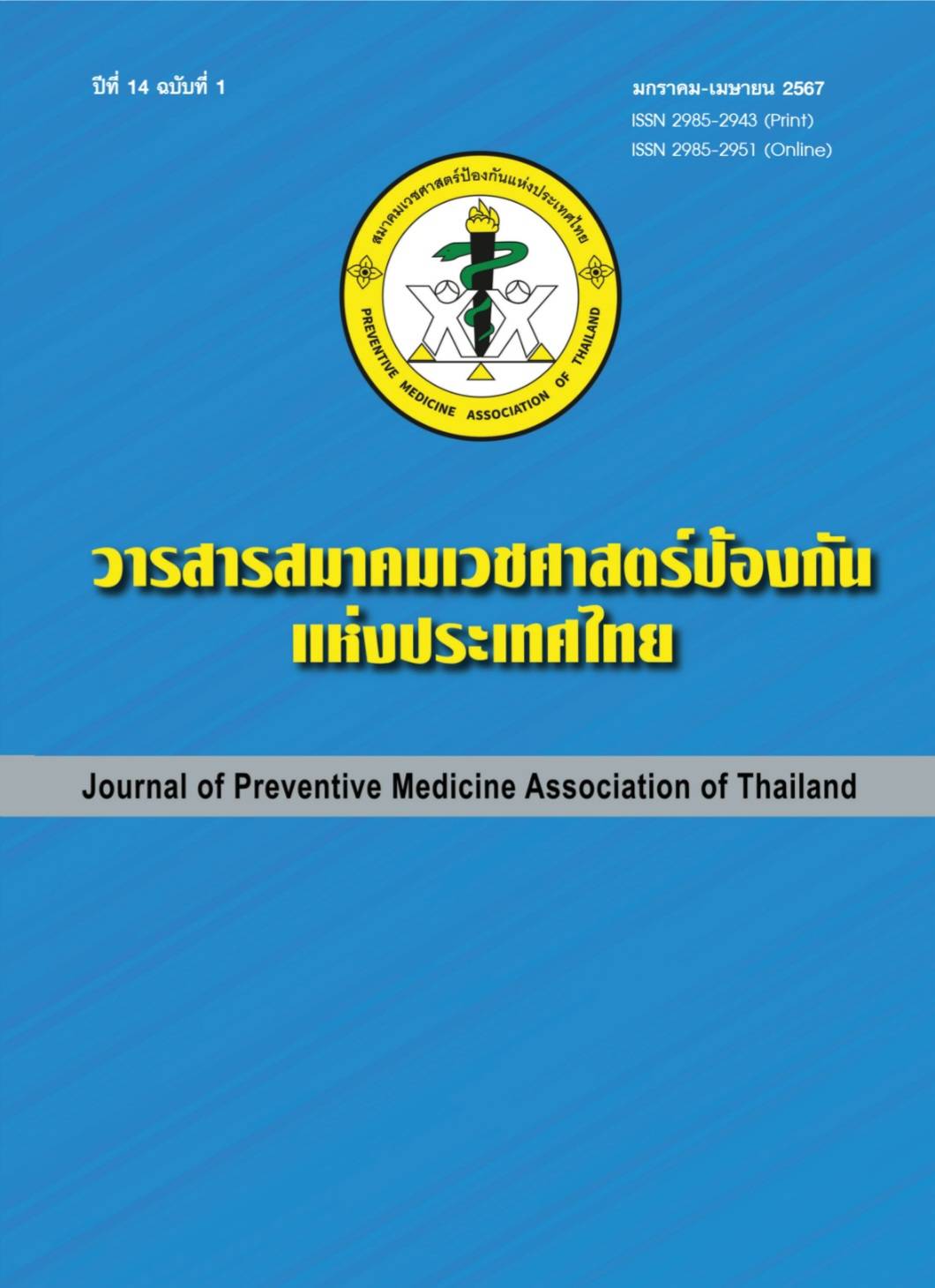Development of a Health Savings Model through Multi-Program Promotion of Working-Age Health to Support an Aging Society in Thai Communities
Keywords:
working-age, health savings model, multi-program promotionAbstract
Objective: This research and development has the objective to develop health promotion and evaluate desirable health savings model through multi-program health promotion and evaluate desirable health behaviors of working-age individuals to support an aging society in the community. Methods: The sample group consisted of 130 health and working age leaders in the sub-district areas of Chiang Mai (Gr.1), Nakhon Sawan (Gr.2), and Phatthalung (Gr.3) Data was collected using questionnaires, interviews, and daily behavioral records for desired health behaviors in 9 activities including food and nutrition, drinking water, exercise, mood, sleep, breast cancer screening, smoking, drinking alcohol and oral health care. Descriptive statistics used to analyze and describe general information. Repeated measures ANOVA were used to evaluate the effectiveness of the program between the 3 groups. Results: The mean percentage of desired health behavior patterns of all 3 groups was as high as 83.8% (good level). However, when analyzed according to activities, it was found that 5 activities were below the mean, including oral health care (39.2%), breast cancer self-examination (48.5%), exercise (53.1%), food (53.1%), and managing emotions and stress (69.3%), respectively. The mean scores of the 9 desired health behaviors were significantly different between Gr.1 and Gr.3 (p<0.001) and Gr.2 and Gr.3 (p<0.001), but there was no statistically significant difference between Gr.1 and Gr.2. For health outcomes, waist circumference in Gr.1 decreased significantly (p<0.05) and BMI decreased in Gr.2 (p<0.05). Moreover, both BMI and waist circumference decreased significantly in Gr.3 (p<0.01). The mean of monthly desired health behavior scores were significantly different in Gr.1 (p<0.001) and Gr.2 (p<0.001). However, the scores of Gr.3 did not change because they consistently maintained good health behaviors. Conclusions: Accumulating health behaviors through a multi-program approach leads to a continuous and consistent pattern of good behavior, resulting in the development of healthy habits. The findings suggest that the Ministry of Public Health of relevant Departments, the National Health Security Office and the National Social Security Office should develop systematic welfare and incentives to promote healthy behavior patterns using incentives such as health points, contributions to savings accounts, or diverse rewards appropriate to the economic and social conditions in Thailand.
References
กิตติ ลาภสมบัติ. รายงานประจำปี 2563 การส่งเสริมให้ผู้สูงอายุมีสุขภาพดี ดูแลตนเองได้และมีคุณภาพชีวิตที่ดี. นนทบุรี: สำนักอนามัยผู้สูงอายุ กรมอนามัย; 2563.
วิชัย เอกพลากร, ทหัยชนก พรรคเจริญ, วราภรณ์ เสถียรนพเก้า. รายงานการสำรวจสุขภาพประชาชนไทยโดยการตรวจร่างกาย ครั้งที่ 6 พ.ศ. 2562-2563. นนทบุรี: สถาบันวิจัยระบบสาธารณสุข; 2564.
องค์การสหประชาชาติ. เป้าหมายที่ 10 : ลดความไม่เสมอภาคภายในประเทศและระหว่างประเทศ [อินเทอร์เน็ต]. 2564 [เข้าถึงเมื่อ 9 ก.ค. 2564]. เข้าถึงได้จาก: https://thailand.un.org/th/sdgs/10
The International Social Security Association (ISSA). Workplace health promotion -workplace health promotion framework [Internet]. 2021 [cited 2021 Jul 8]. Available from: https://ww1.issa.int/guidelines/whp/174865
สำนักงานสถิติแห่งชาติ. การสำรวจแรงงานนอกระบบ พ.ศ.2563. กรุงเทพฯ: สำนักงานสถิติแห่งชาติ; 2563.
สำนักจัดระบบบริการทางการแพทย์. ความเป็นไปได้ของบริการใหม่ด้านการสร้างเสริมสุขภาพในระบบประกันสังคม [อินเทอร์เน็ต]. 2563 [เข้าถึงเมื่อ 9 ก.ค. 2564]. เข้าถึงได้จาก: https://thlp-ops.moph.go.th/pdf/6-7%20%E0%B8%9E.%E0%B8%A2.62/8.pdf
Michaelsen MM, Esch T. Understanding health behavior change by motivation and reward mechanisms: a review of the literature. Front Behav Neurosci 2023;17.
McNeil DW, Addicks SH, Randall CL. Motivational interviewing and motivational interactions for health behavior change and maintenance. In: Oxford handbook topics in psychology. Oxford University Press; 2017.
Awantang G, Helland A, Velu S, Gurman T. Evaluating capacity strengthening for social and behavior change communication: a systematic review. Health Promot Int 2022;37(1):daab068.
Hagger MS, Cameron LD, Hamilton K, Hankonen N, Lintunen T. Changing behavior: a theory and evidence-based approach. In: The Handbook of Behavior Change; 2020.
Michie S, West R, Sheals K, Godinho CA. Evaluating the effectiveness of behavior change techniques in health-related behavior: a scoping review of methods used. Transl Behav Med 2018;8(2):212-24.
Martin LR, DiMatteo MR, editors. The Oxford handbook of health communication, behavior change, and treatment adherence. Oxford University Press; 2013.
Hernandez M, Gibb JK. Culture, behavior and health. Evol Med Public Health 2020;2020(1):12-3.
Downloads
Published
How to Cite
Issue
Section
License
Copyright (c) 2024 สมาคมเวชศาสตร์ป้องกันแห่งประเทศไทย

This work is licensed under a Creative Commons Attribution-NonCommercial-NoDerivatives 4.0 International License.
บทความที่ลงพิมพ์ในวารสารเวชศาสตร์ป้องกันแห่งประเทศไทย ถือเป็นผลงานวิชาการ งานวิจัย วิเคราะห์ วิจารณ์ เป็นความเห็นส่วนตัวของผู้นิพนธ์ กองบรรณาธิการไม่จำเป็นต้องเห็นด้วยเสมอไปและผู้นิพนธ์จะต้องรับผิดชอบต่อบทความของตนเอง






